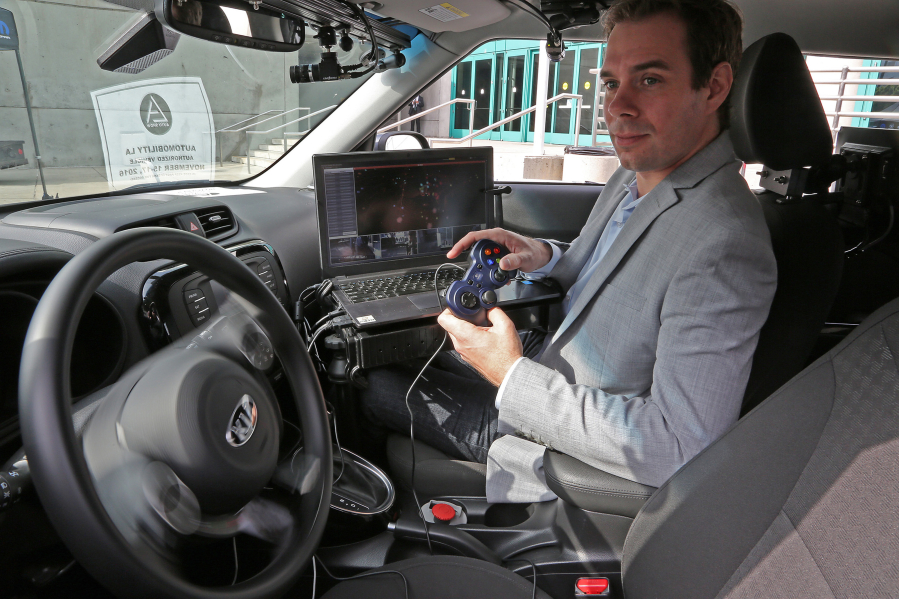LOS ANGELES — When cars exit the tunnel of the next 15 years, they’ll be like giant smartphones.
Their sensors will capture sight, sound and motion and transmit the information to the internet quickly and affordably. The $100 billion app economy built on data from smartphones would look small compared with the $750 billion in revenue produced around cars.
The forecast has automakers buzzing. As they accelerate spending on developing self-driving cars, they’re devoting enormous attention on what to do with data that those high-tech devices generate — beyond making the drive automated. Among the possibilities: selling details about driving patterns to real estate developers or using it in personalized insurance calculations.
But the road to such a future could be more treacherous than traditional giants of the auto industry expect. They’re assuming the costs of sensors will fall enough to justify data collection efforts. They’re betting they can easily transfer the data, though it could be thousands of times the volume discharged by smartphones. And they’re hoping their role — and moneymaking potential — in the new realm isn’t marginalized.
The challenge comes from Silicon Valley breathing down the neck of the old guard. Younger auto rivals Tesla Motors, NextEV, Faraday Future and even Apple could have a head start on reinventing the technical guts of cars to pair with smartphone-grade software.
Automakers tell NextEV U.S. Chief Executive Padmasree Warrior that they’re bulking up software development teams. The former chief technology officer at Cisco Systems and Motorola tells them that’s good, but not sufficient.
“Because of the heritage they have, it’s hard to say, ‘How can I build this from ground zero?'” Warrior said in an interview at the LA Auto Show. “They are trying to look at it as, ‘Can I just get the software and put it on an existing hardware platform,’ and I’m (making) the point it never works that way.”
The full package will come together for some, technologists say. But their concern is that the likes of Ford, Toyota and others are underestimating obstacles. What seems five years away could be 10 years out, and business and strategy executives are jumping the gun on technology development teams.
“To implement data-based business models, cars need to look like cellphones,” said Josh Hartung, chief executive of automotive software startup PolySync.
Hartung founded the Portland company to close the sophistication-gap. PolySync’s software aggregates data from lasers, radar and cameras on the car. Organizing it is meant to help apps harness the data as easily as smartphone operating systems do.
Apple software “is the meat in the middle” for smartphones, Hartung said. But “there’s nothing like that” to turn cars into feature-rich devices.
Genivi, an alliance of auto parts companies, is tackling similar issues. It’s working with leading online technology groups on standards that would enable app makers to write one program and have it function across many vehicles. Without that simplicity, potential buyers for car data may be scared away. But wide adoption of standards isn’t certain.
“That’s the biggest hurdle,” said Rudolf Streif, system architect at Jaguar Land Rover, a Genivi member.
To compensate for data limits and connectivity issues, automakers want to shift some data processing to the car. The idea is that self-driving and other features could be powered by artificial intelligence software without an internet connection.
About 30 data-related business opportunities could produce up to $750 billion in annual revenue worldwide by 2030, consulting firm McKinsey estimated in a September report, comparing it to a forecast of $5 trillion in traditional auto sales.
Tech startups think they’ll have an advantage in the ecosystem, with carmakers leaning on their expertise. It’s already starting to show, with a flood of acquisitions and investments for companies focusing on specific pieces of technology.
But “the only companies that win in the future will be the ones that work on the entire” process, from developing hardware to hawking data, NextEV’s Warrior said during an industry presentation.
Other industries, including retail and entertainment, face the same problems as the auto world in reaching their big-data visions. But in automakers’ heads, the stakes are unequal because self-driving cars could save lives.



